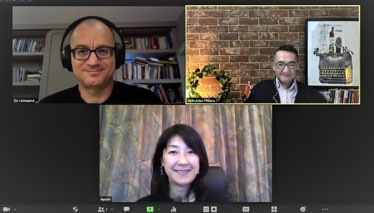株式会社ニューロスペース 日イスラエル中堅・中小企業協業事例 【2020/11/8】
終了済
株式会社ニューロスペース![]()
株式会社ニューロスペース(以下、ニューロスペース)は、2013年12月に設立された。企業の従業員向けに、睡眠計測デバイスとスマートフォンアプリを連携して睡眠の可視化や、データに基づく睡眠改善アドバイスのサービスを提供し、企業の健康経営と生産性最大化の支援を行っている。
2016年3月の株式会社吉野家を皮切りに、国内大手企業90社以上で同社の睡眠改善プログラムが導入されている。また、睡眠テクノロジーとデータ解析をもとに、KDDI株式会社をはじめとした異業種の事業会社とスマートフォン向けアプリ等の共同研究開発を手がける。
2019年7月に総額5億1000万円の調達でシリーズAラウンドを完了した。スリープテック・ベンチャーとして、ベンチャーアワードの受賞歴も有する等、国内でも注目されるスタートアップ企業である。国立研究開発法人新エネルギー・産業技術総合開発機構(NEDO)の研究開発型ベンチャー支援事業には過去2度採択されている。2019年5月には、イスラエルのアーリーセンス社(EarlySense Ltd.)との業務提携を発表した。
※本事例は、株式会社ニューロスペースの公開情報とアーリーセンス社への取材をもとに作成した。
アーリーセンス社は、2004年にイスラエルで創業されたIoTヘルスケアベンチャー企業である。2012年、米国マサチューセッツ州に拠点を開設、2019年に3900万ドルの資金調達ラウンドを完了し、現在は北米・欧州を中心に事業を展開している。
同社の主要製品は、マットレスの下に配置する非接触型のモニタリング機器で、ユーザーの呼吸、心拍数、ベッドでの動きをモニタリングすることができる。非接触型デバイスでありながら非常に高精度であり、ユーザーに負担をかけずに継続的な計測が可能な点が特徴だ。医療従事者はアプリ等を通じて患者をリモートで監視することが可能であり、心拍変化や転倒等の事故関知、褥瘡(床ずれ)防止に有効である。また、計測した多岐に渡るデータを、AIを用いて統合的に解析し、就寝(寝つき)までの時間、中途覚醒時間・回数、ノンレム睡眠やレム睡眠など各睡眠ステージなども精緻に解析できる。
現在、同社の製品は世界中150以上の医療機関で導入されている。また、イスラエル最大のシェバ病院(Sheba Medical Center)で新型コロナウイルスに係る医療従事者と患者の非接触監視にも活用されている。日本では、2020年10月に、株式会社マクニカがアーリーセンス社の開発した介護向け新製品「NooMi(ヌーミイ)」を活用し、介護用見守りシステムを共同開発したことを発表した(同社プレスリリースより)。
アーリーセンス社は、2020年グローバル・デジタル・ヘルス100に選出されたほか、ビジネスモデルやプロダクトは多数の受賞歴を有している。
ニューロスペースとアーリーセンス社は、2019年に業務提携契約を締結し、国内における高精度睡眠計測IoTデバイスの共同展開、および睡眠解析技術の進化を目指した共同研究開発を進めるとしている。この提携は、アーリーセンス社に出資をする三井物産株式会社からニューロスペースを紹介されたことに端を発する。アーリーセンス社は、ニューロスペースが日本のスリープテック・ベンチャーを牽引する存在であり、日本市場に対するビジョンが明確であることから興味を抱き、ビジネス・技術的に非常にフィットすると判断した。協業形態は至ってシンプルであり、アーリーセンス社の提供する睡眠計測IoTデバイスのソフトウェアとハードウェアの両コンポーネントに関するライセンス契約およびリセラー契約を締結している。
アーリーセンス社は、日本企業との協業に数多くのメリットを認識していると言う。日本企業との協業は、本件に限らず大抵スムーズであり、チームワークと信頼、商品サービスの品質管理、サービスレベルの実現、納期へのコミットメント等、どれをとってもレベルが高いと感じるそうだ。カルチャーフィットが高く、大変に仕事が行いやすい。大企業と中小企業のスピード感は多少違うが、その傾向は日本企業に限らず言えることだ。近年は特にドイツ、オランダ等の大企業と比較するとむしろ日本の大企業のスピード感は勝っているのではないかと事業開発担当ディレクターのジヴ・レインワンド(Ziv Leinwand)氏は語る。ただ、日本市場の困難な点といえば、やはり諸規制が強く行政上の手続きが煩雑なことが挙げられるそうだ。
提携自体が2019年からと日が浅く、まだ十分な実績を残しているとは言えない。加えて、ニューロスペースのビジネスは、新型コロナ禍で多少スピードダウンしている面もあると思料するが、この協業は中長期的に双方にとって大変期待できるものであり、企業価値の向上をもたらすと信じている同氏は締めくくった。

アーリーセンス社事業開発担当ディレクター ジヴ・レインワンド氏(左上)
昨今の労働生産性向上の課題認識の広がり、働き方改革関連の規則・法案改正、経済産業省が推進する健康経営銘柄・健康経営優良法人の認定の広がり、また、国連が提唱する「持続可能な開発目標(SDGs)」における「すべての人に健康と福祉を」などにより、社員が健康に働きつづけることに対する企業の責任が問われ、各種の健康経営増進サービスについて社会的なニーズが高まっている。その中で睡眠は健康状態を左右する大きな要因である。
睡眠についての個々の企業のニーズに応えるニューロスペースの提供サービスとして、調査による実態把握、睡眠についての学習(セミナー)そして体感型の睡眠改善プログラムがある。たとえば睡眠に関する調査については、社員の健康課題の中で睡眠に焦点を当てるべきか定量的に把握したい、また、睡眠課題の傾向や睡眠に関わる生活習慣傾向を抽出して施策に繋げたい、あるいは、睡眠施策の効果検証を適切に実施したい等があり、同社はそれらに対応するサービスを有し、改善を重ねている。セミナー内容としては、良い睡眠をとるためのテクニックやウェアラブルデバイスの活用方法、仮眠の戦略的な活用方法などのテーマを、リモートワーク・在宅勤務向けや、サービス業等での変則勤務者向け、ドライバーや運航事業者向けといった対象者を特定した切り口で、供給している。このようなセミナーは新型コロナ禍以前より、全国展開している企業向けにオンラインセミナーを実施していたが、新型コロナ禍を受けて一層オンラインの開催に切り替えた開催に注力している様子であり、比較的影響を受けにくいサービスであると言える。そもそもこの状況下、このビジネスモデルにはかなりの追い風である。コロナ禍についても、企業のリモートワーク推進により、従業員が遠隔でも精神的肉体的に良い状況にあるかを把握する必要性はより高まっている。
ポストコロナにおいてもますます多様な働き方が推進され、また引き続きの少子高齢化社会において、より良い労働環境を有している企業が選別されてゆくと考えられ、また、心身ともに健康で働き続けられる高齢者が歓迎される。それらを受けてこの健康経営促進の潮流はますます加速することが予想され、同社のビジネスには追い風が続くと考えられる。スリープテック分野の競争は加速することも予想されるが、これまでにすでに70社延べ1万人以上のデータを有している(2019年11月現在、同社プレスリリースより)点、また、改善プログラムにおいての改善満足度が80~90%程度と高い(同社HPより)点は評価に値すると考える。
ただ、一部には新型コロナ禍により停滞していると思われる共同開発事業も存在する。しかし、これまで日野自動車株式会社、株式会社アーバンリサーチ(アパレル)、シャープ株式会社、KDDI株式会社やフランスベッド株式会社他との共同事業開発を行っており、多業種との協業が結果的にリスクを下げていると考えられる。
・ 睡眠計測デバイスとスマートフォンアプリを連携した睡眠の可視化
・ 企業の働き方改革・健康経営に貢献
・ 日本×イスラエル スタートアップ同士による協業
|
会社名 |
株式会社ニューロスペース |
|
代表取締役社長CEO |
小林 孝徳 |
|
設立 |
2013年12月 |
|
住所 |
〒130-0003 東京都墨田区横川1-16-3 横川倉庫2F センターオブガレージ |
|
電話番号 |
03-5843-8733 |
|
Website |
取材: 早稲田大学イノベーション・ファイナンス国際研究所
編集: (一財)国際経済連携推進センター
<関連リンク>
 全文
全文